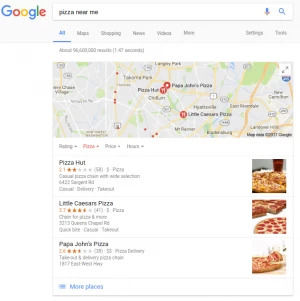Google confirmed that its search algorithm automatically alters its weighting depending on the type of search query the user enters.
Over the past few days, Google representatives have participated in a series of conversations that reveal a bit more about the Google algorithm, confirming what many people had already suspected. It is likely that the Google algorithm actually changes how much it weights different ranking factors depending upon the nature of the search query.
Understanding what the representatives exactly said, and how this impacts marketers, can help our community craft their digital strategies.
What did Google actually say?
Google representatives Gary Illyes and John Mueller have made it clear that there are no concrete "top three" ranking factors on the Google algorithm. John Mueller also says it "makes sense" to have the Google algorithm weigh factors differently depending upon the nature of the query.
To hear the full conversation, watch the Google Webmaster Central office-hours hangout below.
It is important to note that this seems to be in opposition to what Andrey Lipattsev said about 18 months ago. At the time, Andrey had listed content and links as being the top two important criteria in the Google algorithm, with RankBrain being quoted elsewhere as the third most important ranking factor. In our opinion, however, these two conversations don't have to be mutually exclusive.
For example, take the criteria of "content." Even if the Google algorithm weighs factors differently, the quality and value of the content will likely always be a top factor. Other content factors, such as freshness, likely vary in weight depending upon the query. With backlinks, although the importance to individual pages might vary, it's reasonable to assume that the Google algorithm still looks at the number of backlinks to the domain as a whole, bringing the concept of domain authority into the front.
The importance changing weights among Google algorithm factors makes sense when you consider the different types of search results people expect depending upon the type of query they input. For example, someone interested in current events will likely want to find sources that have been published within the last day for up-to-date and accurate information. Thus the freshness of the page will be taken into account to determine the rankings.
On the other hand, a person looking for scholarly research topics will want to find sites that have greater longevity, backlinks, and other authority markers that indicate the trustworthiness of this individual page.
What does this mean for marketers?
Google weighing factors differently depending upon the exact query and intent behind it is another manifestation of Google’s desire to promote optimal user experience. For example, if backlinks were weighed heavily for every search result it might be difficult to get updates on the latest in current events. On the other hand, if they were never considered, it would likely be too easy for sites promoting incorrect academic studies and insight to gain a foothold in the search engine.

For website owners and search marketers, it continues to be impossible to tell exactly what Google weighs heavily for a particular industry, but we can make educated guesses based on what customers likely want to see when making queries. We do know that Google likely considers content, links, and RankBrain to be among the top considerations, and thus SEO strategies should consider these factors. Within each category, however, considerable variability remains.
You should focus on the factors that make the most sense for your individual content, such as reviews and local SEO for brick-and-mortar businesses or fresh, regularly updated sites for news companies.
We recommend that our partners and other members of the BrightEdge community focus on understanding the user intents applicable to their site. Analyze the SERP for queries that drive traffic to your site to better understand how Google interprets the user intent for those questions. Use those insights to determine the optimal types of content for your customers and
the factors that will be the most important in the rankings.
You can also use the BrightEdge platform to find keywords that relate to Quick Answers and other rich answer displays on Google to create a stronger, more intent-driven strategy. As you create content, monitor your progress in BrightEdge to see how well you rank and drive traffic that actually drives revenue.
Google's end goal is to ensure that they're matching users with the content that has the greatest relevance and value for their needs. Though we now know that Google doesn't have a "top 3" ranking factors that applies uniformly to all SERPs, we can make educated estimates about what Google prioritizes for particular user intents. Brands that align themselves well with a positive user experience will increase their chances of earning a strong Google ranking.


